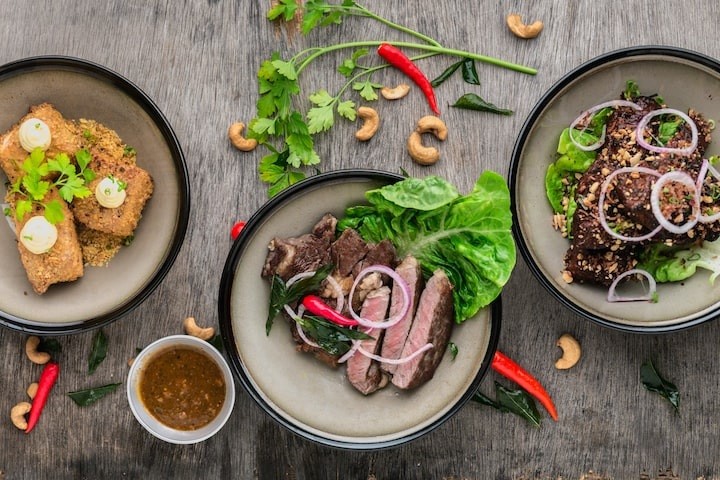Food is more than just sustenance; it is an experience that brings people together, connects cultures, and represents the diversity of our world. From simple home-cooked meals to gourmet delicacies, food reflects who we are, where we come from, and how we connect with one another. In this article, we’ll explore the beauty of food, how it affects our lives, and some of the key trends in the global culinary landscape.
The Essence of Food
Food is essential for life, providing the nutrients our bodies need to thrive. However, it’s not just about survival. Food is a part of our social interactions, celebrations, and daily routines. Whether it’s sharing a meal with family or enjoying street food in a bustling city, food has a unique power to bring people together.
Nutritional Value of Food
Every type of food serves a purpose, whether it’s providing energy, boosting immunity, or promoting overall well-being. We rely on food for macronutrients like proteins, fats, and carbohydrates, as well as micronutrients such as vitamins and minerals. These nutrients help maintain bodily functions and support growth and development.
-
Proteins are crucial for muscle growth and repair.
-
Fats help in energy storage and insulation.
-
Carbohydrates provide quick energy for bodily functions.
-
Vitamins and minerals help regulate body processes, such as the immune system and metabolism.
Food and Culture: A Connection Across Borders
Food is deeply tied to culture and tradition. The recipes passed down from generations, the ingredients specific to certain regions, and the methods of cooking that have been perfected over centuries are a testament to the diverse and rich heritage of food. Each culture has developed its own food system, influenced by climate, geography, and local ingredients.
-
Asian Cuisine is known for its bold flavors, use of rice, and aromatic spices like ginger, garlic, and lemongrass. Popular dishes include sushi, dim sum, and curry.
-
Mediterranean Cuisine is characterized by fresh ingredients like olive oil, vegetables, seafood, and grains. Classic dishes include Greek salad, hummus, and pizza.
-
Latin American Cuisine is vibrant, with an emphasis on corn, beans, and tropical fruits. Tacos, tamales, and empanadas are just a few examples of this flavorful cuisine.
Food is not just about taste; it’s about identity and history. Every bite you take tells a story about a region, its people, and their way of life.
The Impact of Food on Our Health
What we eat directly affects our physical health. A balanced diet can improve our mental clarity, energy levels, and longevity. On the other hand, poor dietary choices can lead to health issues such as obesity, diabetes, and heart disease. It’s essential to make informed decisions about what we eat and how it impacts our well-being.
The Rise of Plant-Based Diets
In recent years, plant-based diets have become increasingly popular. People are moving away from animal products in favor of vegetables, fruits, nuts, seeds, and grains. The benefits of plant-based eating include improved heart health, weight management, and a reduced environmental footprint. Many individuals are choosing vegetarian, vegan, or flexitarian diets to improve their health and contribute to sustainability.
The Role of Superfoods
Superfoods are nutrient-dense foods that provide health benefits beyond basic nutrition. These foods, such as kale, blueberries, and quinoa, are rich in antioxidants, vitamins, and minerals. They help combat inflammation, support immune function, and improve overall vitality.
-
Kale is loaded with vitamin K, which is essential for bone health.
-
Blueberries are high in antioxidants that help fight oxidative stress.
-
Quinoa is a complete protein, meaning it contains all nine essential amino acids.
Incorporating superfoods into your diet can enhance your well-being and prevent chronic illnesses.
Food Trends: What’s Next in the Culinary World?
The world of food is always evolving, and new trends emerge every year. People are more mindful of what they eat, where it comes from, and how it impacts the environment. The rise of digital food delivery services, sustainability efforts, and the growing interest in global cuisine are just a few examples of how food culture is changing.
Sustainable Eating
Sustainability is a significant trend that influences the food industry. People are increasingly aware of the environmental impact of their food choices. From reducing food waste to supporting local farmers and choosing sustainable seafood, there are many ways to eat responsibly. Plant-based options and lab-grown meat are becoming more accessible, providing alternatives to traditional meat consumption.
-
Zero-waste cooking encourages using every part of the ingredient to minimize food waste.
-
Sustainable farming practices focus on reducing environmental harm and promoting biodiversity.
Digitalization of Food Ordering
With the advent of food delivery apps and online ordering systems, the way we experience food has changed dramatically. People now have the ability to order from their favorite restaurants with just a few taps on their phones. The convenience of online food delivery has led to the rise of ghost kitchens, which are delivery-only restaurants that don’t have physical storefronts.
Fusion Cuisine: A Global Melting Pot
Fusion cuisine combines elements from different culinary traditions to create new and exciting dishes. The blending of flavors from various cultures offers a unique dining experience that appeals to a global audience. Examples include sushi burritos, Korean BBQ tacos, and Indian-spiced pizza.
Fusion cuisine reflects the interconnectedness of our world and how food continues to evolve by integrating various culinary practices.
The Importance of Food in Social Settings
Food plays a significant role in our social lives. It is often at the center of celebrations, family gatherings, and casual get-togethers. Sharing a meal with friends or family fosters communication and strengthens relationships.
Food as a Social Connector
Throughout history, food has been a symbol of hospitality and connection. From sharing a cup of tea to a grand wedding feast, food has the power to break down barriers and bring people together. Even in times of crisis, food remains a comforting constant. In many cultures, offering food to guests is a way to show respect and care.
The Evolution of Dining Out
Dining out has evolved significantly over the years. In the past, eating out was often reserved for special occasions. Today, it has become a regular part of daily life. With the rise of casual dining, food trucks, and pop-up restaurants, there are more options than ever to enjoy delicious meals outside the home.
-
Farm-to-table restaurants emphasize locally sourced ingredients and sustainable practices.
-
Food festivals celebrate diverse cuisines, bringing together chefs, food enthusiasts, and vendors.
The Rise of Health-Conscious Dining
As people become more aware of the link between food and health, dining options have shifted to include healthier alternatives. Restaurants are now offering plant-based menus, gluten-free options, and dishes that cater to specific dietary needs. Whether you’re looking for vegan, keto, or paleo options, there are plenty of choices for health-conscious diners.
Conclusion
Food is far more than a necessity; it is a vital part of life that unites cultures, celebrates traditions, and nourishes our bodies. From the simplest home-cooked meals to the most intricate culinary creations, food has the power to shape our experiences and connect us with the world around us. As we continue to explore new trends and adapt to our changing environment, food remains a constant, evolving part of human life.
Whether it’s embracing a plant-based diet, experimenting with fusion cuisine, or supporting sustainable food systems, the way we approach food is always evolving. By understanding the importance of food and making conscious choices, we can ensure that we are nourishing ourselves and the planet for generations to come.

